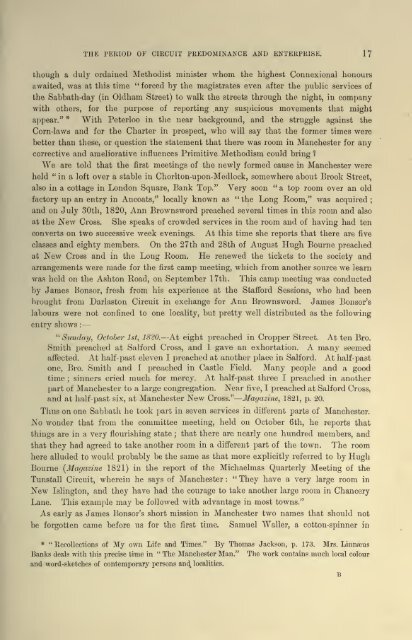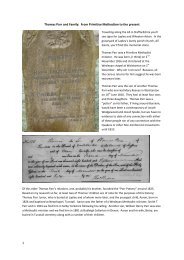Vol 2, pages 1-100 - My Primitive Methodist Ancestors
Vol 2, pages 1-100 - My Primitive Methodist Ancestors
Vol 2, pages 1-100 - My Primitive Methodist Ancestors
You also want an ePaper? Increase the reach of your titles
YUMPU automatically turns print PDFs into web optimized ePapers that Google loves.
THE PERIOD OF CIRCUIT PREDOMINANCE AND ENTERPRISE. 17<br />
though a duly ordained <strong>Methodist</strong> minister whom the highest Connexional honours<br />
awaited, was at this time "forced by the magistrates even after the public<br />
services of<br />
the Sabbath-day (in Oldham Street) to walk the streets through the night, in company<br />
with others, for the purpose of reporting .any suspicious movements that might<br />
With Peterloo in the near background, and the struggle against the<br />
appear." ''<br />
Corn-laws and for the Charter in prospect, who will say that the former times were<br />
better than these, or question the statement that there was room in Manchester for any<br />
corrective and ameliorative influences <strong>Primitive</strong> Methodism could bring<br />
1<br />
We are told that the first meetings of the newly formed cause in Manchester were<br />
held " in a loft over a stable in Chorlton-upon-Medlock, somewhere about Brook Street,<br />
also in a cottage in London Square, Bank Top." Very soon "a top room over an old<br />
factory up an entry in Ancoats," locally known as " the Long Room," was acquired ;<br />
and on July 30th, 1820, Ann Brownsword preached several times in this room and also<br />
at the New Cross.<br />
She speaks of crowded services in the room and of having had ten<br />
converts on two successive week evenings. At this time she reports that there are five<br />
classes and eighty members. On the 27th and 28th of August Hugh Bourne preached<br />
at New Cross and in the Long Room. He renewed the tickets to the society and<br />
arrangements were made for the first camp meeting, which from another source we learn<br />
was held on the Ashton Road, on September 17th. This camp meeting was conducted<br />
by James Bonsor, fresh from his experience at the Stafford Sessions, who had been<br />
brought from Darlaston Circuit in exchange for Ann Brownsword. James Bousor's<br />
labours were not confined to one locality, but pretty well distributed as the following<br />
entry shows :<br />
" Sunday, October 1st, 18W. At eight preached in Cropper Street. At ten Bro.<br />
Smith preached at Salford Cross, and I gave an exhortation. A many seemed<br />
affected. At half-past eleven I preached at another place in Salford. At half-past<br />
one, Bro. Smith and 1 preached in Castle Field. Many people and a good<br />
time ;<br />
sinners cried much for mercy. At half-past three I preached in another<br />
part of Manchester to a large congregation. Near five, I preached at Salford Cross,<br />
and at half -past six, at Manchester New Cross." Magazine, 1821, p. 20.<br />
Thus on one Sabbath he took part in seven services in different parts of Manchester.<br />
No wonder that from the committee meeting, held on October 6th, he reports that<br />
things are in a very flourishing state that there are<br />
;<br />
nearly one hundred members, and<br />
that they had agreed to take another room in a different part of the town. The room<br />
here alluded to would probably be the same as that more explicitly referred to by Hugh<br />
Bourne (Magazine 1821) in the report of the Michaelmas Quarterly Meeting of the<br />
"<br />
Tunstall Circuit, wherein he says of Manchester :<br />
They have a very large room in<br />
New Islington, and they have had the courage to take another large room in Chancery<br />
Lane. This example may be followed with advantage in most towns."<br />
As early as James Bonsor's short mission in Manchester two names that should not<br />
be forgotten came before us for the first time. Samuel Waller, a cotton-spinner in<br />
* " Recollections of <strong>My</strong> own Life and Times." By Thomas Jackson, p. 173. Mrs. Linnaeus<br />
Banks deals with this precise time in " The Manchester Man." The work contains much local colour<br />
and word-sketches of contemporary persons and. localities.<br />
B



